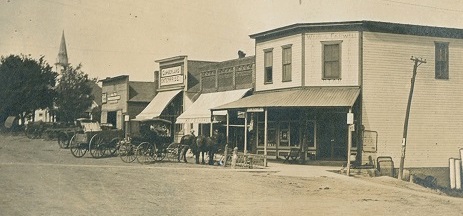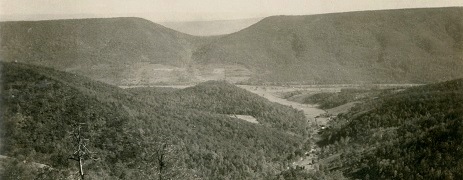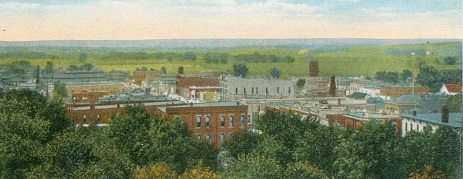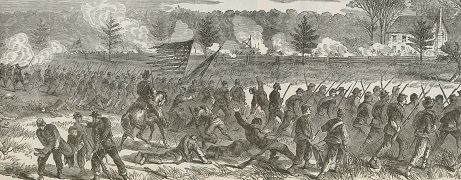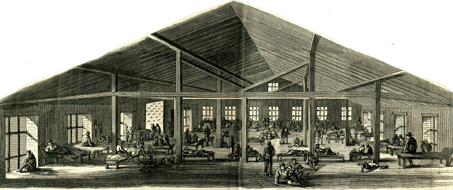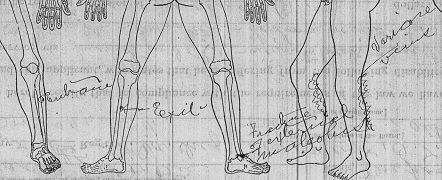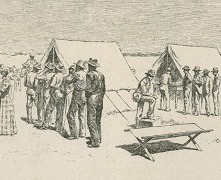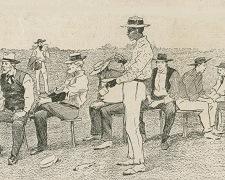
|
Margaret
Rebecca 'Peggy' |
Margaret Rebecca “Peggy” (Younkin) Pringey was born on May 5, 1813 in Turkeyfoot Township, Somerset County, the daughter of Johannes "Frederick" and Catherine (Patton) Younkin.
She never learned how to read or write.
Circa 1832, at the age of about 19, she wed Joseph Pringey (March 10, 1812-1850), son of John and Appolonia "Abigail" (Rhoads) Pringey (or "Pringy") of Lower Turkeyfoot Township. His birth is said to be recorded in the Sanner Church papers.
Other marriages between the Younkin and Pringey clans were Daniel W. and Abiah Virginia "Abi" (Pringey) Younkin and Dr. Jonas and Martha (Pringey) Younkin. As well, Joseph's nephew William McMillen wed Rosanna Ream.
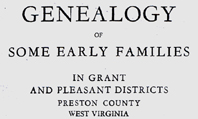 |
|
Book naming the Pringey infants |
Peggy and Joseph went on to produce
eight known children -- Philip Pringey, Ross Pringey, Frederick Pringey, Catherine Pringey, Herman
Pringey, John Pringey, Candace "Candy" Liston and
Abigail Sarah "Abbie" Martin.
At the death of Peggy's father in 1843, the Pringeys took advantage of the opportunity to purchase and flip part of the deceased's 124-acre farm, farmhouse and outbuildings for $1,116. The tract was bordered by the properties of H.L. Holbrook on the south, John Broucher on the west, the deceased's estate to the north and Chew and Wilcocks on the east. Joseph quickly sold the same piece of ground to Frederick Blubach for $1,600, a neat profit of $484.
From the estate of Peggy's late first cousin John J. Younkin, the Pringeys in 1846 purchased another farm north of the Jersey Baptist Church in Ursina, comprised of about 299 acres, 100 of which were cleared. The tract adjoined the farms of Michael Ansell and Henry Younkin. Joseph sold the tract in 1846 to Henry Krieger/Kreger. The Pringeys' farm was located north of the Jersey Baptist Church in Ursina. It was comprised of about 299 acres, 100 of which were cleared, and adjoined the farms of Michael Ansell and Henry Younkin. Joseph sold the tract in 1846 to Henry Krieger/Kreger. Local electors are known to have met in their dwelling-place in 1847, now occupied by George Ansell.
The family in about 1846-1848 migrated from Somerset County across the state line into Virginia after the birth of their sixth child, Candice. They settled in District 45 in what is believed to have been Bruceton Mills, Preston County, part of the state which was partitioned into West Virginia during the Civil War.
Their new farm site was between the Pennsylvania border on the north and the Connelly farm on the south. There, their seventh and last child was born in 1848.
Grief cascaded over the family when their six-year-old daughter Catherine died in 1847. Her tender remains were lowered under the sod of a burying ground one half mile east of the White School house, owned by Russell Smith. It's said that a stone erected at her gravesite was carved only with her initials "C.P."
When the federal census of Preston County was taken in 1850, Joseph was listed as a farmer, and his sons Philip and Ross as "labourers."
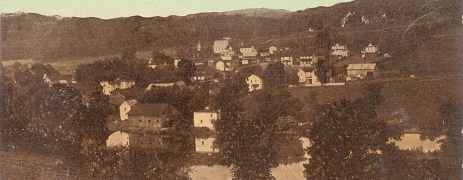 |
Bruceton Mills, WV, along the Cheat River |
Sadly, Joseph was taken by the Grim Reaper at the age of 38 years, 9 months and 9 days in May 1850. He was laid to rest in the Smith farm cemetery where his daughter Catherine was interred.
Peggy lived for another 13 years. During that period she endured the untimely death of her son Ross in 1851 at the age of 15 years, 5 months and 8 days.
The family is believed to have joined the Hazel Run Baptist Church, 3.5 miles northwest of Bruceton Mills at the junction of three roads. Their son Philip signed a covenant forming the congregation on July 1, 1856, and later with his brother Frederick served as a trustee and deacon. Their sisters Candice and Julia Abigail joined the church when each reached 15 years of age. They all are mentioned in the 1933 book by Edward Thorp King, Genealogy of Some Early Families in Grant and Pleasant Districts, Preston County, West Virginia.
After the outbreak of the Civil War, three of Peggy's sons and two future sons in law joined the Union Army and fought for West Virginia/Maryland regiments -- Frederick (3rd Potomac Home Brigade Infantry, Company G), Herman (3rd West Virginia Infantry, Company H), John (14th West Virginia Cavalry, Company B), Henson Smith Liston (6th West Virginia Cavalry, Company H) and Jacob Tucker Martin (7th West Virginia Infantry, Company A).
Heartbreak enveloped the family in the first few days of 1863 when Peggy received word that her son Frederick had died at Camp Parole on Jan. 3, 1863 at the age of 22 years, 9 months and 24 days. He was laid to rest in the same cemetery as his brother Ross. He had joined the Union Army in March 1862 and was promoted to first lieutenant in September 1862 and had served for only 10 months until his demise. He is named in a roster of Company G soldiers in the book History and Roster of Maryland Volunteers, War of 1861-5, Vol. 1 and in William Harrison Lowdermilk's book History of Cumberland from the Time of the Indian Town.
Just two months after her son's death in the Army, Peggy passed away in Preston County on March 12, 1863, age 49 years, 10 months and 7 days. She reposes in the same cemetery as her husband and sons, among only eight known burials at the site. [Find-a-Grave] The Genealogy book noted that the graveyard was on "the Russel Smith farm about one-half mile east of the White School house in the northern part of Grant District."
In the years immediately after the war's end, each of her adult children relocated to Iowa and settled in or near Cumberland, Cass County.
In 1932,
inscriptions from the Russell Smith Cemetery were copied and published in
the Genealogy of Some Early Families book.
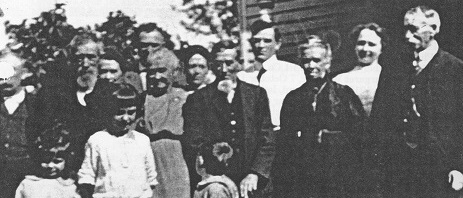 |
| Some of the adult Pringeys and their offspring. Courtesy Michael P. Connelly |
~ Son Phillip Pringey ~
Son Phillip
Pringey (1834-1915) was born on Dec. 17, 1834 in Somerset County.
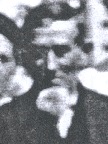
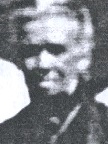
Courtesy Michael P. Connelly
As a boy, he migrated into Virginia with his parents and settled in Preston County (later part of West Virginia).
At the age of 23, on Oct. 7, 1858, Philip married 18-year-old Sarah Margaret Wheeler (1840-1927). The ceremony took place in the Hazel Run Baptist Church, of which he was a charter member.
They lived in Preston County and had these known children: Edward Pringey, Judson Pringey, Martha Jane "Mattie" Conine,
Mary Hannah Howell, Ross William Pringey and Bruce Franklin Pringey.
He is not known to have served in the Civil War.
In August 1864, at their home in Preston County, the Pringeys hosted the wedding of Philip's sister Candace to recently returned Civil War veteran Henson Smith Liston. Philip also was named the legal guardian for his younger sister Abbie.
After the end of the Civil War, in about 1868 or 1869, the family pushed westward to Iowa, where they put down roots in Wapsinonoc, Muscatine County, IA. There, their son John was born in 1870, the first of their offspring to be born in Iowa. They are listed in the 1870 census of Wapsinonoc, with Philip's occupation given as farmer, and Sarah's as "keeping house."
|
|
|
Dirt-paved street, horses and buggies in Cumberland, Iowa |
Later, they relocated to Cumberland,
Cass County, IA.
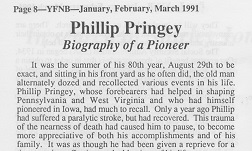
Having suffered a cerebral hemorrhage, leading to paralysis, Philip died in Cumberland on Aug. 29, 1915, and was buried in Newlon's Grove Cemetery. [Find-a-Grave]
Sarah passed away in Cumberland at the age of 86 on Aug. 15, 1927.
Their descendant Donald Bruce Howell was in communication with Younkin Reunion-East founder Donna (Younkin) Logan in the 1990s.
Son Edward James Pringey (1859-1933) was born on Oct. 20, 1859 near Bruceton Mills, Preston County, VA (later West Virginia). As a boy, he migrated to Iowa with his parents and siblings. On Oct. 17, 1888, when he was three days shy of his 29th birthday, he married Margaret A. Smith (1867-1939). They resided on a farm north of Cumberland, IA, and their two known children were Birdie Juanita Pringey and Walter Pringey. Sadly, little Birdie died died in 1892 at the age of two. When Edward placed a load of his steers on the market in April 1908, the Marshalltown (IA) Evening Times-Republican noted that they averaged 1,362 lbs. in weight at $6.65 in value and one cow at 1,540 lbs. priced at $5.80. He also offered a load of 262-lb. hogs valued at $5.92˝.In late May 1910, the Pringeys were involved in a motor accident near Cumberland. While driving a boy to the town of Wiota, the "boy was thrown out alighting on his feet," reported the Evening Times-Republican.
The force of his jump kept him running many years before he could stop. The car was running very fast and skidded in a soft spot in the road where grading had been done. The occupants were thrown out with great force. Mrs. Pringey suffered a broken leg. Mr. Pringey's arm is in such a condition that it is doubtful whether it can be saved.... Assistance did not reach the injured people for over an hour after the accident.
Edward died on Feb. 13, 1933, with interment in Newlon's Grove, Cass County. [Find-a-Grave]. Margaret lived for another six years and passed into eternity in 1939.
- Grandson Walter Pringey (1892-1952)
Son Judson Smith Pringey (1862- ? ) was born on July 23, 1862 near Bruceton Mills, Preston County, VA (later West Virginia). He and his family became pioneer settlers of Iowa, in Cass County, when he was a boy. On Feb. 11, 1891, at age 28, Judson entered into marriage with Bertha Blankenship ( ? - ? ). Their union only lasted for under five years, when death cleaved him away. He died on Christmas Day 1895, with burial is Newlon's Grove Cemetery. [Find-a-Grave]
Daughter Martha Jane "Mattie" Pringey (1865-1935) was born on Jan. 26, 1865 near Bruceton Mills, Preston County, VA (later West Virginia). She joined her family in their cross-country migration to Iowa. On Sept. 14, 1892, she wed James Wood Conine ( ? - ? ). Sadly, Martha passed away in Newton, IA on Jan. 4, 1935.
Daughter Mary Hannah "Mollie" Pringey (1867-1966) was born on June 7, 1867 near Bruceton Mills, Preston County, VA (later West Virginia). Because of the proximity, she often told her family and friends that she had been born in the much larger Uniontown, Fayette County, PA or at Wheeling, Ohio County, WV. When she was age one or two, she traveled cross country with her parents and siblings during their migration to Iowa, settling eventually in Cass County. On March 22, 1891, when she was age 23, she was united in wedlock with 29-year-old Hardy Hickman Howell (1862-1937), son of George Noble and Lorinda (Hickman) Howell, and a native of Vermillion County, IL. They made their home in Cass County for their entire married life and were members of the First Baptist Church of Cumberland. The couple produced six children -- George Philip Howell, Olive Pearl Howell, Ross Pringey Howell, Harley Walter Howell, Oda Blanche Lucas and Lulu Belle Mattheis. Hardy passed away on Aug. 22, 1937. Sadly, she outlived not only her husband but both of her married daughters. Mollie died in Griswold, Cass County on Dec. 19, 1966 at the age of 99. Rev. Ed Woltson preached her funeral service, followed by burial in Newlon's Grove Cemetery. [Find-a-Grave] An obituary was published in the Atlantic (IA) News-Register.
- Grandson Harley Walter Powell ( ? - ? ) was born in (?). He was united in wedlock with Geneva Engelmann ( ? - ? ). The couple made their home in Chicago in the 1930s. Their son Harley Thomas Howell (1937- ? ) was an attorney in Baltimore for many years with the firm of Semmes Bowen & Semmes and served on the board of directors of the Baltimore Symphony Orchestra, and was listed in Who's Who in America.
- Grandson Ross Pringey Howell ( ? -1988) was born in (?). On June 24, 1924, he was married to Mary Ellen Andrew (1906-2007), daughter of Clayton and Ella (Tucker) Andrew of near Cumberland. They remained together for 65 years until the separation of death. They produced two sons -- Dr. Billy Dale Howell and Dr. Donald "Bruce" Howell. Myrtle was a member of the Atlantic Gospel Chapel of the Cumberland-Atlantic area. Said a local newspaper, she "was employed at the Cumberland post office for several years and with the exception of a brief period in the 1940's, working in a defense plant in California, she spent her entire life in Cass County." Ross died in 1988. Mary survived him by nearly two decades. She passed into eternity at the age of 100 on Jan. 29, 2007 in Heritage House in Atlantic. Their son Bruce -- a member of the Oklahoma Educators Hall of Fame -- authored the two-part article, "Phillip Pringey: Biography of a Pioneer," which was published in the Younkin Family News Bulletin in the January 1991 and April 1991 issues.
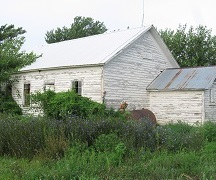 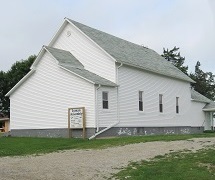 |
| Above, L-R: Pringey School and Newlons Grove Church, renamed "Lyman Assembly." Below: Cumberland, IA today. Courtesy Michael P. Connelly |
Son John Pringey (1870-1894) -- possibly also known as Ross William Pringey -- was born in April or May 17, 1870 in Wapsinonoc, Muscatine County, IA or in Cedar County, IA. As a boy, he and his family settled in Cumberland, Cass County, IA. At the age of 23, Ross died on April 29, 1894. His remains were placed into repose in the Newlon's Grove Cemetery. [Find-a-Grave]
Son Bruce Franklin Pringey (1875-1969) was born on Oct. 19, 1875 in West Liberty, IA. He was joined in marriage on Dec. 2, 1903 with Anna Rosina "Rose" Hargis (Feb. 12, 1882-1967), a native of Mendota, LaSalle County, IA. During his lifetime he served as a deputy auditor for Dallas County and in November 1927, on the resignation of Robert H. Murray, was promoted to auditor. He was re-elected to the position in July 1933. In 1932, representing Dallas County, he served on a resolutions committee for the State Association of County Officers. At some point he was elected mayor of Adel, IA. Bruce and Rosena in June 1938 traveled to West Liberty in company with his sister Mollie Howell and Mr. and Mrs. Will Propst to jon the town's centennial anniversary observance. He died in Dexter, Dallas County at the age of 93 on Feb. 1, 1969. He and Rose repose for all time in Oakdale Cemetery in Adel.
~
Son Frederick
Pringey ~
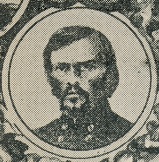
Son Frederick Pringey (1839-1863) was born in about 1839.
He grew up on his parents' farm in Preston County, WV.
Frederick never married.
In March 1862, as the Civil War was reaching its first anniversary, he was recruited into the 3rd Maryland Home Brigade at Bruceton Mills. Among the other men in the regiment was James K. Martin, husband of his cousin Margaret Minard , also of Preston County. They were dubbed the "West Virginia Snake Hunters."
The newly minted soldiers left on March 31, 1862 and joined their new unit at Springfield, WV two days later. They were ordered to Romney and Mansfield, WV with short stops at each, and then to Franklin, WV, where they saw their first action under the command of Gen. Schenck against Confederate forces led by Gen. Thomas "Stonewall" Jackson. Their next movement was to Harper's Ferry, WV, making encampments at Petersburg, Wardensville, Seneca, Burlington and Kearneysville.
Showing leadership skills, Frederick was promoted to first lieutenant of his company in September 1862. The 3rd Potomac took part in three days of fighting at Harper's Ferry on Sept. 12, 14 and 15, 1862, and surrendered to the enemy under the commands of Jackson, Gen. A.P. Hill and Gen. James Longstreet. After about a week as a prisoner of war, Frederick and his mates were paroled on Sept. 21 and sent to Camp Parole in Annapolis, MD.
In the final month of 1862, or perhaps as the new year turned in 1863, Frederick contracted a deadly case of typhoid fever. Sadly, it claimed his life, and he succumbed in his quarters at Camp Parole on Jan. 3, 1863 at the age of 22 years, 9 months and 24 days. A notation in his papers held at the National Archives states that his "Body taken home by his friend."
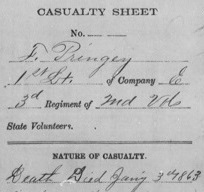 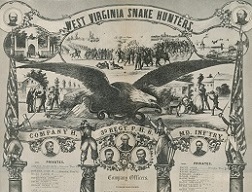 |
| Frederick's record at the National Archives, and the 3rd Maryland Home Brigade broadsheet in which he is pictured. |
At the time of his death, Frederick had served in the army for only 10 months. The remains were laid to rest in the same cemetery as his brother Ross, less than a mile east of the White Schoolhouse.
In April 1863, a broadsheet poster was printed featuring the 3rd Potomac, in color, bearing a photograph of Frederick and his fellow officers in the regiment. A black and white version was folded and tipped-in to the 1933 book, Genealogy of Some Early Families in Grant and Pleasant Districts, Preston County, West Virginia, authored by Edward Thorp King, of Marshalltown, Iowa.
Frederick is named in a roster of Company G soldiers in the book History and Roster of Maryland Volunteers, War of 1861-5, Vol. 1 and in William Harrison Lowdermilk's book History of Cumberland from the Time of the Indian Town.
 |
 |
| The names of Frederick and cousin James K. Martin in a list of 3rd Maryland Home Brigade soldiers in the 1882 History of Preston County, West Virginia |
~ Son Herman Pringey ~
Son Herman
Pringey (1842-1932) was born on St. Patrick's Day 1842 in Turkeyfoot Township, Somerset
County.
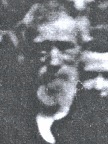
Courtesy Michael P. Connelly
He came to Preston County, VA in the late 1840s with his parents and siblings. In adulthood, he stood 5 feet, 9 inches tall, with light complexion, blue-grey eyes and brown hair.
When the Civil War broke out, Herman joined the 3rd West Virginia Infantry, Company H. He enlisted at Bruceton Mills, Preston County on June 28, 1861 and later was mustered into the army at Clarksburg, WV. The regiment later combined with the 6th West Virginia Cavalry, Company H, where he was promoted to corporal. In July 1861, during an outbreak of measles in camp at Clarksburg, WV, Herman became ill and was treated in a hospital. Then while at New Creek (Keyser) WV in August 1861, Herman began to suffer from chronic diarrhea, a common problem with soldiers in camp. The regiment was stationed at Martinsburg, WV when Herman was injured with a hernia on or about Jan. 25, 1864.
He was discharged at Wheeling, WV on Aug. 16, 1864. After several months, he enlisted again, in February 1865, as a substitute in the 17th West Virginia Volunteer Infantry, Company K. He was honorably discharged for a second time at Wheeling after the close of the war on June 30, 1865.
In October 1864, while at home on leave, Herman attended wedding of his sister Candace to Civil War veteran Henson Smith Liston at a ceremony held at the home of their brother Philip Pringey in Preston County. Also present at the event was Herman's future bride, Sarah Kirby (1848-1925).
A year and a half after his return home after the war, and not yet married, Herman moved to Iowa. His first settlement there was in Muscatine County. In 1869, he settled on a farm in Noble Township near Cumberland, Cass County. At some point, Sarah joined him in Noble as did his married sister and brother in law, Abbie and Jacob T. Martin.
On Dec. 23, 1869, at the age of 27, Herman and the 21-year-old Sarah finally were joined in matrimony. The ceremony took place at the county clerk's office in Tipton, Cedar County, by the hand of Robert Ferguson, just two days before Christmas
They together produced seven known children -- Ora "Orie" Pringey, Charles Pringey, Frederick Pringey, Emma Pringey, Carrie Bell Taylor, John Pringey and Lillian Green Anderson.
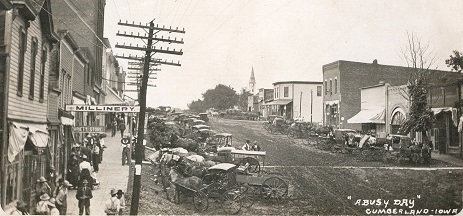 |
| Above: "A busy day" in Cumberland, Iowa. Below, Cumberland today. Courtesy Michael Patrick Connelly. |
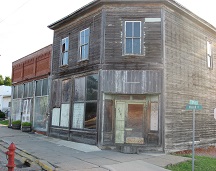 |
They resided in Noble in 1880 when enumerated in the U.S. census, living next door to his younger brother John and family. In January 1890, Herman began receiving military pension payments from the government for his wartime service. [App. #748.552; Cert. #547.827] He claimed disability for chronic diarrhea, hemorrhoids, rheumatism, liver disease and a hernia on his right side. He wore a truss, but felt it was uncomfortable. In 1915, when his pension payments were increased in value, his name was printed in a related story in the Marshalltown (IA) Evening Times-Republican.
Herman is referred to as a "permanent and respected member of the community" in a profile of his brother in law Henson Liston in the 1906 book Compendium of History and Biography of Cass County, Iowa (Chicago: Henry Taylor & Company).
Sarah suffered a stroke of paralysis and was an invalid for the last few years of her life. She passed away on July 7, 1925 in Cumberland.
Herman survived her by a little more than seven years. He resided with his unmarried daughters Orie and Emma and was confined to the home due to poor eyesight, failed hearing and occasional profuse nose bleeds. While able to eat, dress and bathe by himself, he required their assistance in most other things.
At the age of 90, he died in Cumberland on July 23, 1932. Their remains were placed into eternal rest in the Newlon's Grove Cemetery in Noble Township. [Find-a-Grave] At his death, he left behind about $750 in cash, a minimum of household furniture worth $75 and a house and lot in Cumberland.
He is profiled in the 1884 book History of Cass County, Iowa. Together With Sketches of its Towns, Villages and Townships, Educational, Civil, Military and Political History: Portraits of Prominent Persons, and Biographies of Old Settlers and Representative Citizens. Springfield, Ill.: Continental Historical Company (p. 667).
Daughter Ora "Orie" Pringey (1871-1927) was born on June 10, 1871 in Iowa. She did not marry but resided for decades with her parents and unmarried sister Emma in Cumberland. After their mother's death in 1925, Orie and Emma assumed primary care for the aged father. When his health began to decline seriously in September 1931, their assistance on his behalf became almost full-time. Also helping provide medical care were Dr. R.M. Sorensen and nurses Minnie Reed and Ada Black of Cumberland. Death swept him away on Jan. 20, 1927 in Cumberland.
Son Charles Pringey (1872- ? ) was born on Dec. 7, 1872 in Iowa. He is believed to have dwelled in Greenfield, IA.
Son Frederick Pringey (1875-1966) was born on March 13, 1875 in Iowa. In adulthood he made a home on Adams Street in Cumberland. Frederick passed away on June 10, 1966.
Daughter Emma Pringey (1880-1967) was born on March 13, 1880 in Iowa. She apparently never married and in May 1929 dwelled with her sister Emma in Cumberland, taking care of her aged father. At that time, she wrote of her father: "...he requires the personal aid and attendance of myself and has required it for more than a year on account of his physical condition, his eyes are bad, he is feeble and cannot be allowed to leave the premises. I have to watch out for him every day and all the time. I do not leave him alone any of the time." The angel of death carried her away on July 17, 1967.
Daughter Carrie Bell Pringey (1882- ? ) was born on Dec. 30, 1882. She entered into marriage with (?) Taylor ( ? - ? ).
Son John Pringey (1885-1916) was born on Jan. 2, 1885 in Cass County. He died on Sept. 18, 1916, at the age of 30.
Daughter Lillian Green Pringey (1890-1979) was born on March 9, 1890. Circa 1932, she wed Ralph Anderson ( ? - ? ). She surrendered to the spectre of death in Cumberland on June 12, 1979.
~ Son John E. Pringey ~
Son John E.
Pringey (1844-1918) was born on Feb. 12, 1844 in or near Kingwood, Somerset County.
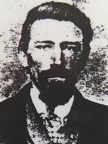
Courtesy Michael P. Connelly
He was a pioneer of Iowa and was thrice married. As an adult, he stood 5 feet, 6 inches tall and weighed 145 lbs., with a dark complexion, dark hair and blue-grey eyes.
As a child, with his parents and family, John migrated across the state line from Pennsylvania into Preston County, VA (later part of West Virginia).
John took up arms for the Union cause during the Civil War, as did his brother Herman and brothers-in-law Henson Smith Liston and Jacob Tucker Martin.
He enlisted at Kingwood, Preston County and was assigned to the 14th West Virginia Cavalry, Company B, commanded by Capt. Clinton Jeffers. Among his bunk mates was John Myers. During the winter of 1862-1863, while in camp at New Creek (now Keyser), WV, John began to suffer from camp fever and loose bowels. Wrote his bunk mate Myers: "I thought the chances of recovery decidedly against him." Added the regiment's lieutenant John M. Jeffers: "I thought he would die."
John also experienced "tortured" pain in his kidneys and was sent to a hospital in Cumberland, MD, where he eventually recovered and returned to the regiment. During the fall of 1863, John and his regiment were on duty at Mechanic Gap and Petersburg, WV. He was discharged on June 27, 1865 at Cumberland and was sent to Wheeling, WV before returning home. En route, on the Fourth of July 1865, he ran into future brother in law and fellow Civil War veteran Jacob Tucker Martin, who later recalled noticing that John was not very stout and was having troubles with a lame back and kidneys.
|
|
|
New Creek (Keyser), WV where John became ill during the war |
Immediately after the war, in October 1865, John migrated to Iowa and first settled in West Liberty, Muscatine County. He began farming there the following spring. After spending several years there, he relocated again in May 1869 to Cumberland, Cass County.
On Sept. 4, 1873, at Atlantic, Cass County, IA, and at the age of 29, he wed 24-year-old Savannah C. "Anna" Green (1849-1881). She was a native of Ohio (although also stated as Gallia, Gallia County, IA). Rev. E.S. Hill officiated.
They bore two children -- Alvin John Pringey and Maud Ethel Pringey. John kept an old family Bible in which were written his name and birthdate and similar details for other family members. It had been published by the American Bible Society in 1859.
|
|
|
Leafy Atlantic, Iowa |
The federal census of 1880 shows the family living as farmers in Noble, Cass County, with farm laborer Phillip Walter boarding in their residence. John often worked and rode with Marcellus H. Coburn of Cumberland. Friends noticed that at times he was only able to perform light work and at other times no labor at all.
As he aged, John began to increasingly suffer from rheumatism, diarrhea, kidney trouble, a weak back and poor circulation to his feet and limbs. In June 1889, John was awarded a military pension in compensation for his wartime ailments. [App. #712.651, Cert. #480.812] When examined in 1913, a physician wrote that he had "crooked, deformed and enlarged finger joints in the fingers of both hands. Has had frequent attacks of Sciatica and more or less generalized rheumatism."
In 1890, after the
death of his brother in law Henson Smith Liston, he signed an affidavit to help
his widowed sister to obtain her late husband's Civil War pension. He also provided testimony for his brother in law Jacob T. Martin, a wounded veteran of the war.
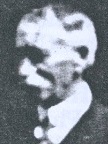
Courtesy Michael P. Connelly
Sadly, Anna died in Cumberland at the untimely age of 32 on March 2, 1881. Her remains were placed into eternal repose in Newlons Grove Cemetery.
After a little more than 12 months as a widower, John wed again, on March 9, 1882, to Esther (Lewis) Green ( ? -1890). John Herron performed the nuptials in the Newlons Grove Church. Heartache followed eight years later, when Esther died in Cumberland on May 17, 1890, with burial in Newlon's Grove Cemetery.
Not content to be alone, John wed a third time to Rachel J. (Moore) Thomas Hardin (1839-1927), daughter of Eli Moore. Their wedding took place on New Year's Day 1893 in Corning, Adams County, IA, with Rev. A.Y. Cupp officiating. Several years earlier, she had been divorced from Phillip Hardin -- son of B.C. and Mary (Moore) Hardin -- having lived together in Fayette County, PA and then in Tranquility, Adams County, OH.
John lived to the age of 74, and was taken in death in Cumberland on April 5, 1918. He was interred in Newlons Grove Cemetery near Cumberland, with Floyd H. Whitney handling funeral and burial arrangements.
After his death, Rachel filed for and began receiving his Civil War pension. [App. #1.121.968, Cert. #862212] Rachel died in 1927. [Find-a-Grave] Providing support in writing for her claim were her husband's brother and sister, Herman Pringey and Candace Liston.
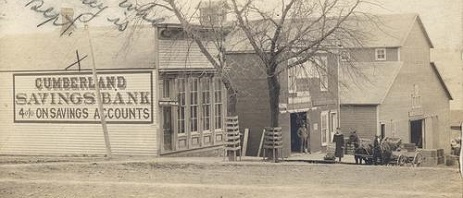 |
| Cumberland Savings Bank, Iowa. Courtesy Michael Patrick Connelly |
John and his brother Philip and brother in law Henson Liston are named in the 1934 book A Century of Iowa Baptist History: 1834-1934, saying that they were "active members" of the Newlon's Grove church "whose work and influence were outstanding." The genealogy of John and Anna is spelled out in Faith Marie Moore and Albert Moore's 1983 book Green-Prose: The Ancestors of Albert Wilson Luce Moore Junior, Vol. 2A.
Son Alvin John Pringey (1874-1937) was born on June 23, 1874 in Cass County, IA. He never married but "was a farmer for 45 years," said the Green-Prose history. He died at the age of 62 in Jones Hospital in Atlantic, Cass County on March 30, 1937. Burial was in Newlon's Grove near Cumberland.
Daughter Maud Ethel Pringey (1879-1974) was born on July 24, 1879 in Cumberland, Cass County, IA. At the age of 20, she wed Leroy Howard (1881-1957), son of Willis Benton and Kimetia (Brenneman) Howard. They had seven children -- Virgil Howard, Raymond Howard, Hubert Howard, Mabel Gwen Howard, Carol Lucile Howard, Eleanor Maud Howard and Russell Howard. The Howards relocated to North Dakota, where they resided in the town of Bowman, Bowman County. Leroy died in Bowman at age 75 on Jan. 23, 1957. Maud survived him by 17 years, and spent her final time in Bowman, Bowman County, ND. She died there at age 94 on March 22, 1974, with burial in New England, Hettinger County, ND.
~ Daughter Abigail Sarah "Abbie" (Pringey) Martin ~
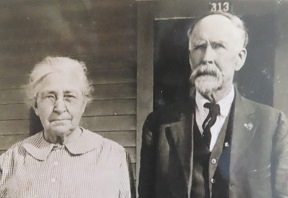 |
Abigail and Jacob Martin Courtesy Michael Patrick Connelly |
She was just two years old when her mother died and 15 at the death of her father. Because she was an orphan, her brother Philip was assigned as her legal guardian.
At the age of 15, on Feb. 3, 1867, Abbie joined the Hazel Run Baptist Church near Bruceton Mills.
Then when she was age 17, on March 5, 1865, she was united in marriage with 21-year-old Civil War soldier Jacob Tucker Martin (March 3, 1844-1932), who was home on military furlough in Preston County. The ceremony took place in Brandonville, Preston County, officiated by Rev. Wilson of the Methodist Episcopal Church, and her married sister Candace Liston attending. Despite the fact that Abbie was legally underage to marry, her brother Philip signed his consent.
Jacob was the son of farmers Daniel T. and Elizabeth (Teets) Martin of Bruceton Mills, also known as Muddy Creek, Preston County. He stood 5 feet, 5 inches tall, with a light complexion, blue-grey eyes and light-colored hair. He also had a tattoo on his left forearm. Among his siblings were Simon R. Martin, Jasper N. Martin, Sarah I. Martin, Samuel J. Martin, Rachel Martin, Josiah T. Martin and L.N. Martin. Circa 1860, when Jacob was a teenager, his parents and family lived for a time on a farm in New Martinsville, Wetzel County, VA. Then in 1861, he obtained farm work for William Harned of Bruceton Mills and shared a home with his brother Simon.
Their six known children were Laura A. Cassil, Margaret E. "Maggie" Pulley, Frederick S. Martin, Mattie W. Vierson, Nellie G. Cobb and Caddie Cobb.
After the eruption of the Civil War, Jacob went to Oakland, MD on Sept. 4, 1861 to join the Union Army. He was assigned to the 7th West Virginia Infantry, Company A and saw service for three and a half years. Several of his brothers also joined the Union Army, among them Simon with the 3rd Maryland Potomac Home Brigade Infantry, Company H and Samuel with the 1st West Virginia Infantry, Company H.
|
Civil War action at Cold Harbor, where Jacob was wounded |
Jacob and Jacob W. Thomas were bunkmates. The regiment was stationed at Romney, WV during the first of January 1862, with Jacob and his brother Samuel meeting for a New Year's dinner. The 7th West Virginia was on duty at the Paw Paw Tunnel in mid-February 1862 and proceeded on a forced march to Bloomery Gap in Hampshire County, WV. The regiment waded across a creek twice in a day, and that night six inches of snow fell without the men having adequate cover in their wet clothing. From Bloomery Gap they moved to Falmouth, near Fredericksburg, VA. Recalled friend John L. Everly: "If I remember right it was in August 1862 that Jacob T. Martin had a sun stroke with quite a number of others. The reason I remember that circumstance so well, he Martin was just behind me in rank. When he fell he struck me with his gun across the shoulder with considerable force. Just at that moment I got angry until I look around and took in the situation. I saw the man was in a bad condition from sun stroke." An immediate after-effect was that Jacob became temporarily blind, and had to be helped back to camp by some of his mates.
While at Harrison's Landing, VA, around the time of the Seven Days Battle, Jacob contracted diarrhea as did many of his fellow soldiers, so that only 11 men of the company were fit for duty. "I could not state positively that [Jacob] had Diarrhea or not, but he no doubt had it as it was an Epidemic," stated his company commander, Capt. S.W. Snider. "The water was very bad. And dead mules lying around. And the heat intense. And nearly the whole Army was sick." Jacob was sent away to Newport News, VA and thence to rejoin the regiment in Alexandria, VA.
In December 1863 or early January 1864, the regiment had to cross the freezing cold Rapidan River by wading "and could have no fire at night as we had to lay in front of the enemy in our wet clothes," recalled friend Everly. "We first crossed the Rapidan and attacked the enemy who was too much for us. We had to recross [and] had to lay in our wet clothes at night." Jacob was discharged and re-enlisted the same day on Jan. 3, 1864 at Stevensburg, VA. He received a furlough at some point in 1864 and returned to his father's home. Recalled Jacob's brother L.N. Martin of Valley Point, Preston County: "I saw him there at that time [1864] he was complaining then he said it was Rheumatism. his arms was so stiff he could hardly Dress and undress him self."
While in action at Cold Harbor, VA, on June 3, 1864, he received a wound in the shoulder. His fellow soldier John H. Borgman saw him lying on the ground, unable to move. He endured another sun stroke on Aug. 19, 1864 along the Weldon Railroad. As Jacob recalled: "I just fell by the wayside, was unable to go any farther. I got tht way by carrying a wounded man, Geo. Connor in a blanket. We put him in an aubulance and then started to march and I could not. John C. Felton helped me carry Connor."
Then, on Oct. 27, 1864, the regiment saw action at Boydton Plank Road, also known as Hatcher's Run, VA. Union forces of 30,000 men matched up against Confederate troops numbering 11,690, with the Union suffering 1,758 casualties and the Confederates 1,300. At that battle, Jacob was taken prisoner at Burgess Mill and may have been wounded in the shin.
|
Above: Libby Prison's interior where men spent days filled with despair. Below, miserable, dirty and starving POWs killing time. |
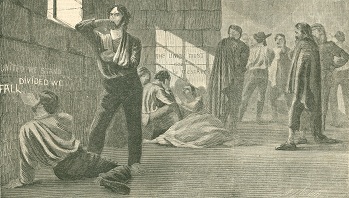 |
Jacob and his fellow POWs were taken to Richmond for imprisonment at the filthy Libby Prison. Within several days, while walking with the aid of crutches, down some slippery steps, he fell and badly dislocated and fractured his left leg, and was admitted to a Confederate general hospital No. 12 in Richmond, possibly Pemberton. Occasionally, one of the cooks would bring Jacob a little beef to eat. Said the Wichita (KS) Beacon, "Prisoners were on the list to be exchanged ande among them was Mr. Martin. A comrade had received a message that his wife was seriously sick in the North. Mr. Martin gave the man his place on the 'exchange.' Later another exchange was made and Martin was included in the list."
A little more than three months later, on Feb. 7, 1865, he was paroled at Cox'sWharf in Virginia and reported to Cottage Green Barracks in Maryland. Physicians ordered him to a division hospital no. 2 in Annapolis, MD and remained until Feb. 16, 1865, when he received a 30-day furlough. When the furlough ended, he reported to Camp Chase, OH and received a 30-day extension of his furlough.
His service is spelled out in the 1906 book Compendium of History and Biography of Cass County (Chicago: Henry Taylor & Company). The entry reads: "He was with the Union Army of the Potomac and participated in the McClellan campaign; was with Burnside at Fredericksburg, with Hooker at Chancellorsville, with Meade at Gettysburg, and with Grant at the siege of Petersburg. He was taken prisoner at Hatch's [Hatcher's] Run, confined at Richmond, Va., returned to his regiment, veteranized in 1864, and was honorably discharged from the service June 25, 1865." He also saw action at Antietam, Second Bull Run and the Wilderness campaign.
After a stop in Annapolis, MD, Jacob returned home to Preston County as a civilian. His brother L.N. Martin noted that Jacob " again visited our home in 1865 about march. he then had just returned from Prison. he then complained as he did before, also he had bin wounded in his left legg Below the knee and had his right ankle fractured." Later in 1865, while riding on horseback with friend William H. Maust to the county seat, he complained of the pain in his legs. At some point after his return, he and his brother Samuel traveled to Buckhannon, WV to see their older brother Simon who was stationed there. The State of West Virginia awarded him a medal of honorable discharge, melted down and fashioned from captured Confederate artillery.
In April 1867, the couple relocated to the midwest, traveling to Iowa. After initially living in West Liberty near Muscatine, Muscatine County, Abbie and Jacob moved to Cass County, IA and then obtained land in October 1869 in Noble Township. Later, Jacob acquired from George Carter a 240-acre farm in Bear Grove Township, Section 28. Cousin William P. Martin came to Cass County and worked for Jacob, sometimes two or three months at a stretch.
|
Surgeon's sketch of Jacob's leg and foot injuries during the war, among them the gunshot in the left shin and calf; fractured right ankle; and varicose veins |
On May 19, 1870, Jacob was awarded a federal pension as compensation for his wartime service. [Invalid App. #156.533 - Cert. #116.946] He was a member of the Worthing Post of the Grand Army of the Republic (GAR), a veterans' organization.
The Martins were founding members of the Newlon's Grove Baptist Church, in Edna, IA, with its first services held on Jan. 17, 1872 in their home, with Rev. C. Brooks and Rev. J. Currier leading the small congregation. After a period of meeting in members' residences, the group began to use a newly built school house circa 1873. Abbie served as the initial clerk of the church, and her brother in law Henson Smith Liston was the original deacon.
Jacob sprained his left ankle in a freak accident in 1877 or 1878. While working in a water well, and standing on a ladder, he said, "the rung gave way and I jumped off and stepped on a board in such a way as to sprain my foot and ankle so that I was laid for about two or three weeks. I was in the house unable to walk."
The Martins became aware in the late 1880s that land was available for settlement by non-Indians in the Oklahoma Territory. In 1893, when Abbie was age 45 and Jacob 49, they decided to migrate to Oklahoma to try to stake a claim in the Cherokee Strip. It was a two-mile-wide, six million acre tract of former grazing land at the northern border of the territory. Set up as a type of race among 100,000 potential settlers, the Cherokee Strip land run was considered the largest in the history of the United States, and took place on Sept. 16, 1893. "Together with his wife and children Mr. Martin made the run September 16," reported the Wichita Beacon. "They were more fortunate than some of the pioneers of this country and secured a claim on Bodock creek...." Their new farm was located two-and-a-half miles northwest of Ponca City, Kay County, OK.
|
Cherokee Strip land run scenes, Sept. 1893 -- above left: registration booths on the border. Above right: lines waiting their turn to register. Below: the grand rush at noon on Sept. 16, looking east, from sketches made by H. Worrall. Harper's Weekly. |
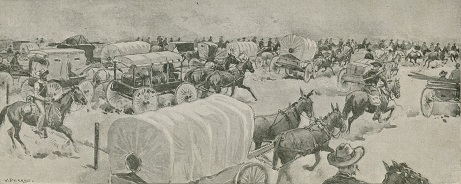 |
During the winter of 1901, Jacob's cousin William P. Martin of Cass County stayed at their home for about three months. In 1905, the Martins retired from farming, apparently having lost the farm to "contest" after a dozen years of residence, and moved to the address of 307 South Elm Street in Ponca City. While there, Jacob was a member of the Masons lodge and served as constable.
Jacob's brother Simon, who spent his adult years in Masontown, Preston County, said in 1900 that he had only seen Jacob twice since the move west some 35 years before.
As he aged, he suffered from declining vision, kidney disease and varicose veins. Over the years, he received medical examinations by military surgeons to determine the extent of his disabilities. Various friends provided written testimony in support of Jacob's requests for an increased pension, among them brothers in law Herman Pringey and John Pringey; William D. Titchenell of Terra Alta, WV; Lucian Sliger of St. Joe near Albright, WV; M.H. Cobun of Saletha, KS; James Pulley of Cross, OK; W.P. Martin of Harrison, OK; William H. Maust of Hope Church, Allegheny County, PA; John L. Everly of Bruceton Mills; William M. Jenkins of Kingwood, WV; cousin by marriage Levi Mountain; farmer R.B. Newlon; S.H. Tucker; his former commanding officer and now flour miller Samuel W. Snider of Grinnell, IA. Rolla F. Martin and E.C. Martin were second cousins.
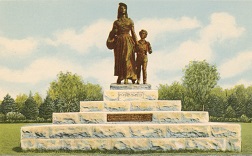 |
Ponca City landmark -- the women pioneer statue |
Jacob returned east in July 1914 to attend a reunion of veterans of the Battle of Gettysburg.
Addie and Jacob celebrated their golden wedding anniversary on March 5, 1915 with a gathering of their family in Ponca City. A newspaper reported the story and was picked up by the Wichita Beacon in Kansas. The story said that Jacob was "the only survivor of the battle of Gettysburg living in Kay County" and added that he "is hearty and stout as is also Mrs. Martin." When they reached their 57th wedding anniversary in 1922, another story ran in the Beacon.
In mid-December 1926, at Ponca City, he was found to have advanced hardening of the arteries, an enlarged heart and chronic bronchitis, with his teeth all having been extracted.
Jacob was burdened with a complete obstruction of his common bile duct, and when added to acute bronchial pneumonia, succumbed at the age of 88 on March 31, 1932. Iinterment was in Ponca City's IOOF Cemetery.
Abbie survived her spouse by two years. She began receiving her late husband's monthly pension payments. [Widow App. #1.715.948 - Cert. #A-6-16-32 - XC 2.649.587]. Stricken with uremia and kidney problems, she died at the age of 86 on Sept. 22, 1934. She rests for eternity beside her husband in the Odd Fellows Cemetery in Ponca City. [Find-a-Grave]
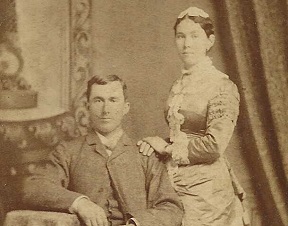 |
Laura and Harvey Cassill wedding day Courtesy Mark Cassill |
Copyright © Mark A. Miner 2014-2019, 2023 |
Research for this page graciously shared by Michael Patrick Connelly and the late Donna (Younkin) Logan. |
